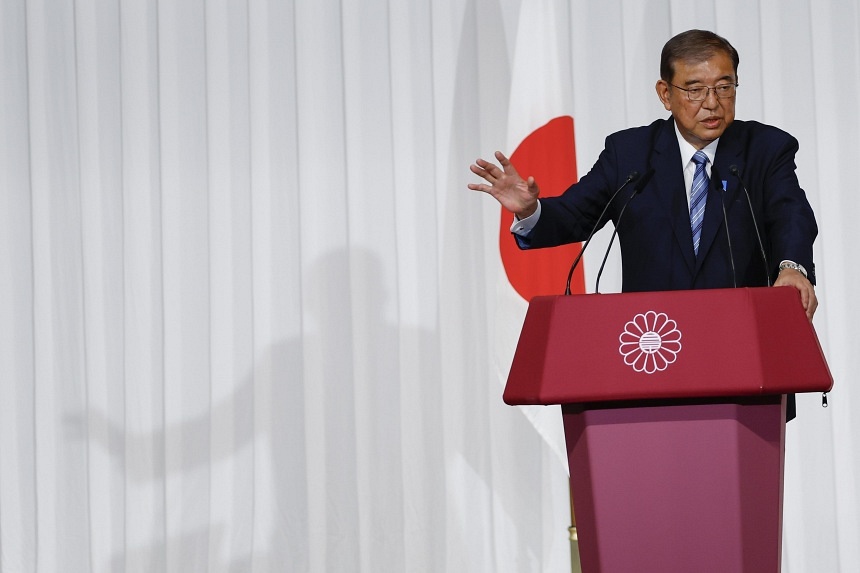
Updated
Oct 29, 2024, 12:05 PM
Published
Oct 28, 2024, 08:10 PM
SINGAPORE - Asean needs to relook how it tackles a range of global challenges that includes the geopolitical contest between the United States and China, and may need a “reboot” to maintain the grouping’s centrality, a regional forum heard on Oct 28.
There is more pressure on the 10-member grouping these days to directly or indirectly choose sides, said Cambodian Senior Minister Sok Siphana, noting that this might be in specific fields such as technology and supply chains. “We will be asked to pick a side. And this dilemma is deeper than meets the eye.”
The challenges range from territorial disputes and strategic uncertainties to the rise of economic nationalism within Asean and beyond. Other issues include the US-China strategic rivalry, increasing protectionism and the conflicts in Europe, the Middle East and Myanmar.
Dr Sok noted that the US has, in the past decade, especially under former president Donald Trump, recalibrated its global commitments, while China has grown “readier and readier by the day” to assert its own version of world order.
Dr Sok is Senior Minister in charge of Special Missions (Multilateral Trade and Economic Affairs) and adviser to the Cambodia government.
Today, the US remains the No. 1 source of foreign direct investment in Asean, while the grouping’s trade in goods with China has nearly tripled, from US$235.5 billion in 2010 to US$696.7 billion (S$922.2 billion) in 2023.
While praising “the Asean way” that values consensus and non-interference, which for the most part has allowed the grouping to convene and manage growing geopolitical risks and sensitive matters, Dr Sok said there must be a “reboot” of how member states interact, and approach issues.
“I’m not talking about more infrastructure, more FTA (free trade agreements). I’m talking about a new-vision reboot, to re-energise itself,” he said, adding that the grouping had to start “thinking outside the box” to deal with long-drawn-out issues, such as the continued conflict in Myanmar following the 2021 military coup.
“So amid this period of great transformation, the question is to what extent Asean is able to defend a stable, multipolar world order in the Indo-Pacific region without isolating China. And to avoid, as during the Cold War, once again becoming another theatre of conflict,” he said.
He said that strengthening and maintaining intra-grouping solidarity will keep the strategic balance between major powers.
Asean itself was formed in 1967 at the height of the Cold War, during a time when there were fears of a protracted period of disputes and proxy wars in the region.
Past conflicts, such as the Vietnam War followed by the Cambodian Genocide, during the period of the Cold War, are a harsh reminder of some of the “darkest” periods” in the region, said Dr Sok.
Addressing diplomats, academics and other thought leaders at the forum organised by the Asean Studies Centre at the ISEAS – Yusof Ishak Institute, several panellists and speakers attempted to unpack the regional grouping’s strategy towards multipolarity.
Asean, which recently concluded its annual leaders’ gathering in October in Laos, has enjoyed “quiet success”, said ISEAS director and chief executive officer Choi Shing Kwok in his opening remarks.
He said that for more than five decades, the grouping has enjoyed relative peace, stability and security that allowed for economic and developmental growth, but this is changing and the “Goldilocks period” is now over.
“We believe that it is a timely opportunity to take stock of the pertinent issues confronting the region and how it should respond to these issues in the face of ongoing global challenges,” he said.
Some have questioned the effectiveness of the “Asean way”, particularly given its slow or lack of progress in resolving regional issues like the Myanmar crisis and tensions in the South China Sea. But Dr Sok said a measure of the grouping’s success is seen in how it has “consistently resisted” the notion that the contest between major powers is a zero-sum game.
“We have managed to reframe this approach to the region into an opportunity to promote cooperation and trust,” he added.
He also said the rules-based international order must be preserved, which was why Cambodia made the “tough decision” to condemn Russia’s invasion of Ukraine at the United Nations General Assembly vote in 2022 despite its long history of friendly relations with Moscow.
Former World Bank managing director Mari Pangestu, who was recently appointed Indonesian President Prabowo Subianto’s special envoy on trade, told the forum that Asean must lead the way for stronger economic integration.
This can be done through various new and existing mechanisms, like trade pacts and plans for digital and green-energy collaboration.
Currently, intra-trade in Asean stands at about 20 per cent in relation to member states’ total trade, which several speakers agreed could be improved on, for better cooperation and collective prosperity.
Dr Mari, who was a panellist, said that Asean must lead the way by strengthening its approach towards issues such as economics, technology and security. “(All of these aspects) have to be integrated, we don’t want to be fragmented,” she said.
Meanwhile, Asean’s importance and influence continues to lie in its convening and normative power, specifically in how this can bring powers of varying influence to the table as well as its use of instruments such as the Asean Charter, said Dr Sok.
Raising the point of Asean centrality, which is the regional framework supporting the grouping’s role as the dominant driving force for its relations and cooperation with external partners, Dr Sok said this continues to be the bedrock of multilateral diplomacy.
“It’s important that we ask them, the big powers, the major powers, to continue to support us, and not to undermine us. Because at the end of the day, Asean is the only game in town in the region,” he said.

 By The Straits Times | Created at 2024-10-29 22:23:00 | Updated at 2024-10-30 07:28:12
1 day ago
By The Straits Times | Created at 2024-10-29 22:23:00 | Updated at 2024-10-30 07:28:12
1 day ago



